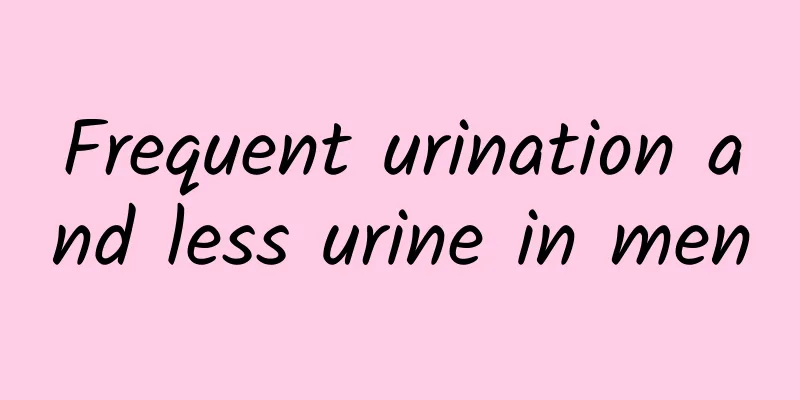Frequent urination and less urine in men

|
Many men have frequent urination and little urine. There are many reasons for this. It may be caused by cystitis, prostate hyperplasia, or physiological reasons such as drinking too much water. In the face of this situation, people need to pay special attention to understand the cause and take the right measures to treat it. Let's take a detailed introduction to why men urinate frequently and have little urine. reason: 1. Increased urine volume: Under physiological conditions, if you drink a lot of water, the amount of urine will increase, and the frequency of urination will also increase, resulting in frequent urination. Under pathological conditions, such as some patients with diabetes and diabetes insipidus who drink a lot of water, have a large amount of urine and urinate frequently. 2. Inflammatory stimulation: Acute cystitis, tuberculous cystitis, urethritis, pyelonephritis, vulvitis, etc. can all cause frequent urination. Under the stimulation of inflammation, frequent urination, urgency, and pain may occur at the same time, which is called urinary tract irritation. 3. Non-inflammatory irritation: such as urinary stones, foreign bodies, etc. 4. Reduced bladder capacity: such as bladder space-occupying lesions, pressure from an enlarged uterus during pregnancy, tuberculous bladder contractions, or larger bladder stones. 5. Psychoneural frequent urination. You need to go to the hospital for a detailed examination to find out the cause and carry out effective treatment. Different treatment methods are selected according to the different causes of frequent urination. It is recommended that you go to the hospital for an examination. Treatment: 1. Middle-aged and elderly men with frequent urination, increased nocturia, difficulty urinating, dribbling urine, thin urine stream, prolonged urination time, etc. may be suspected of prostate hyperplasia. See a urologist promptly. 2. If patients have increased drinking, eating, and urinating, accompanied by weight loss, etc., consider the possibility of diabetes. See an endocrinologist immediately. 3. If you have frequent urination, accompanied by urinary tract irritation symptoms such as urgency and pain, or fever, consider the possibility of urinary tract infection and see a nephrologist promptly. 4. If the patient has persistent thirst, polydipsia, polyuria, frequent urination, dehydration, malaise, headache, weakness, etc., consider the possibility of diabetes insipidus. See an endocrinologist immediately. 5. Continuous or repeated frequent urination with small urine volume each time and no urgency or pain during urination may indicate hysteria or neurogenic bladder. See a neurology or psychiatric doctor immediately. 6. Other severe, persistent or progressive symptoms or signs occur. All of the above require prompt medical consultation. The doctor may recommend blood routine, urine routine, prostatic fluid, urodynamics, immune function, X-ray, B-ultrasound, cystoscopy, urodynamics and other tests to confirm the diagnosis. Drugs with better therapeutic effects: One is oral medication, and the other is topical medication. Oral medications for frequent urination are mainly some antifungal, antibacterial and anti-inflammatory drugs. For example, enteric-soluble aspirin tablets and valacyclovir tablets in Western medicine. These two drugs can quickly penetrate into the urinary system, kill bacteria, and control frequent urination. However, since enteric-soluble aspirin tablets and valacyclovir tablets are Western medicines belonging to the antibiotic class, they have certain side effects and cannot be used for pregnant women, the elderly, and infants. The second type is some topical medications, such as potassium permanganate topical tablets, female suppositories, vaginal suppositories, etc. Supplements are suitable for patients who are in a special period of physical condition and cannot be treated with medication. For example, children, the elderly, and pregnant women with frequent urination can use suppositories and vaginal suppositories for treatment. Because it is sterilized from the outside, the side effects are relatively small. |
<<: Legs go limp after ejaculation
>>: There is white discharge in boys' underwear
Recommend
Why does testicle pain occur after jumping from a height?
The testicle is an important part of the male rep...
What are the black spots on the glans?
The most common cause of black spots on the glans...
How often is ejaculation considered normal?
Key reminder: The time of frequent ejaculation in...
What to do if a 50-year-old man has dark spots on his face?
As the saying goes, men are in their prime at 41,...
Ways to increase endurance
If a man's duration during sex is particularl...
How long does it take for acute prostatitis to heal?
In recent years, more and more men have suffered ...
The glans penis is very sensitive and it hurts when touched
We male friends all know that if the sexual nerve...
Causes of red and itchy foreskin
I believe everyone knows the importance of foresk...
What should I do if I often ejaculate?
Men are very different from women, especially in ...
What is the cause of nocturnal emission in dreams?
Nocturnal emission is a very normal condition. Af...
What medicine should men take for impotence?
Many organs of the human body cannot function nor...
What is the reason for the pimple on the scrotum that does not hurt or itch?
The pimples on the scrotum are not painful or itc...
The dangers of inguinal hernia, these four points men must know
Hernia is a common disease. Generally speaking, i...
Kissing not only makes you sexy, but also has these benefits
People often can't help wanting to kiss when ...
What are the symptoms and manifestations of kidney deficiency in men?
Hello, I am fine, everyone is fine! A healthy kid...









